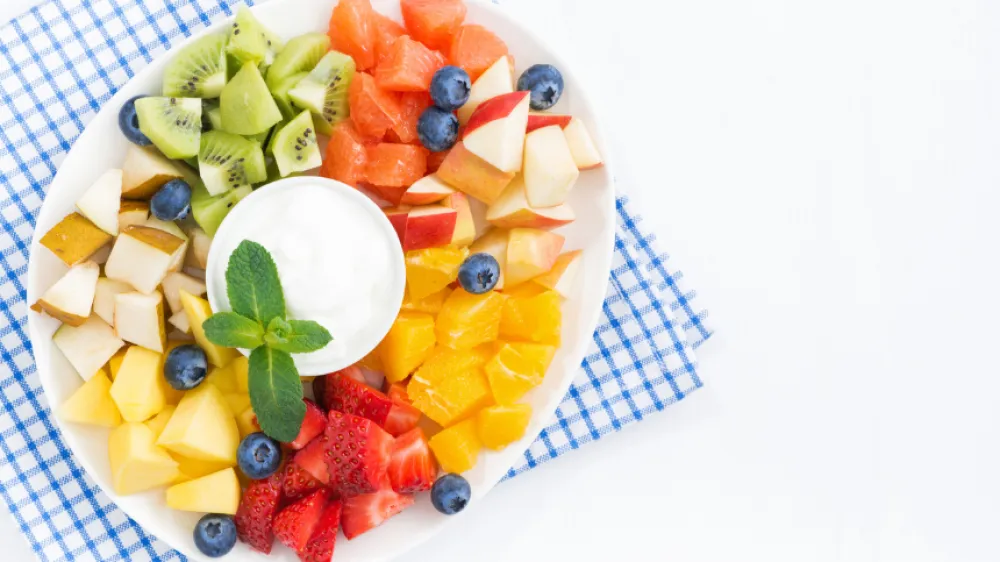Providing your location allows us to show you nearby locations and doctors.
The best and worst sugars for a healthier summer

05/30/2025
Learn how different types of sugars impact your weight. Discover tips to enjoy outdoor summer meals while supporting your weight loss and overall health goals.
By Erica Seebeck, APRN, Bariatric Medicine, Internal Medicine, Nuvance Health
Whether you’re enjoying a backyard barbecue, sipping iced tea on the porch or celebrating with a picnic at the park, summer is filled with sweet temptations. But not all sugars are created equal — especially when it comes to your weight, metabolism and long-term health.
As you get older, our metabolism naturally slows down and our body becomes more sensitive to the effects of sugar. Over time, too much added sugar can contribute to weight gain, inflammation and increase the risk of conditions such as type 2 diabetes, heart disease and cognitive decline.
Natural vs. added sugars: What’s the difference?
Not all sugar is bad. In fact, sugar is a natural carbohydrate found in fruits, vegetables, dairy and whole grains. These naturally occurring sugars are paired with fiber and nutrients that help your body digest them more slowly and efficiently.
Related content: The truth behind common nutrition myths
Added sugars, on the other hand, are the extra sweeteners found in sodas, desserts, sauces and packaged snacks. They provide little to no nutritional benefit and are quickly absorbed into the bloodstream, causing spikes in blood sugar and insulin.
The problem isn’t the sugar in a fresh peach you are enjoying on a hot summer’s day; it’s the added sugar in that jar of store-bought peach iced tea or a piece of fruit pie that makes managing weight and metabolic health more difficult.
The worst sugars for metabolic health
During the warmer months, sugary beverages and cold treats are especially tempting and more readily accessible. But consuming too many added sugars can lead to increased fat storage, especially around the abdomen and contribute to insulin resistance, a key factor in metabolic syndrome and weight gain.
Sugars to minimize
- Table sugar (sucrose): Common in baked goods, candy and desserts.
- High fructose corn syrup: Found in soda, sweet teas, barbecue sauces and processed snacks.
- Agave nectar: Often marketed as a healthy alternative but high in fructose, which can burden the liver.
- Fruit juices: Even 100% juice can be high in sugar and low in fiber—making it easy to overconsume calories.
High levels of fructose can overwhelm your liver and lead to fat buildup, increasing the risk for nonalcoholic fatty liver disease. This is particularly important to monitor in patients over 55, who may already have slower liver metabolism.
Better sugar choices for summer
The good news? You can still enjoy the sweetness of summer while supporting your health and weight management goals.
Choose these sugars instead
- Whole fruits like watermelon, berries, peaches and cherries. They’re full of fiber and hydration — perfect for summer snacking.
- Naturally sweet vegetables like roasted sweet potatoes, grilled corn and carrots.
- Unsweetened iced teas with lemon or mint for flavor without the added sugar.
- Low-sugar yogurt or cottage cheese with fresh fruit for a cooling, protein-packed treat.
Related content: Quick and Tasty on-the-go snacks for busy days.
If you want dessert, try making your own with whole ingredients. A frozen banana blended with a little peanut butter can feel indulgent without the sugar crash.
Sugar, stress and emotional eating
Summer should be a time of enjoyment, but changes in routine, travel and social gatherings can lead to increased stress—and sugar cravings.
Sugar can light up your brain’s reward centers like a spectacular firework display, especially when you are feeling tired or emotionally drained. This can lead to stress eating, which is a common barrier to weight loss.
Related content: Stressed out? Discover the effect of stress on the brain and ways to manage it.
Instead, try incorporating stress management techniques like:
- Walking outdoors: Even a short walk after dinner can lower blood sugar and reduce cravings.
- Hydration: Thirst can often be mistaken for hunger. Carry a reusable water bottle and infuse it with citrus or cucumber for flavor.
- Mindful eating: Pause before meals to assess hunger, eat slowly and savor the food.
A better approach to metabolic and bariatric weight management
Weight management that includes a focus on nutrition, exercise, behavioral support and expert medical care, will ensure better results.
Related content: 5 best exercises for weight management
The focus is not just on cutting calories — it’s about creating sustainable habits that improve your metabolism and help you feel better overall. If sugar feels like a constant struggle, you’re not alone. Many people over 55 find success with medically supervised weight loss plans.
The bottom line: Making smarter sugar choices can help you enjoy your summer while supporting your metabolism, weight loss and long-term health. You don’t have to give up sweetness — you just have to choose the right kind.
Small, consistent changes — like swapping out sugary drinks for water or fresh fruit — can have a big impact. It’s never too late to make meaningful improvements today.
Ready to take control of your weight this summer? Book now with a bariatric medicine specialist and start your journey to better health.